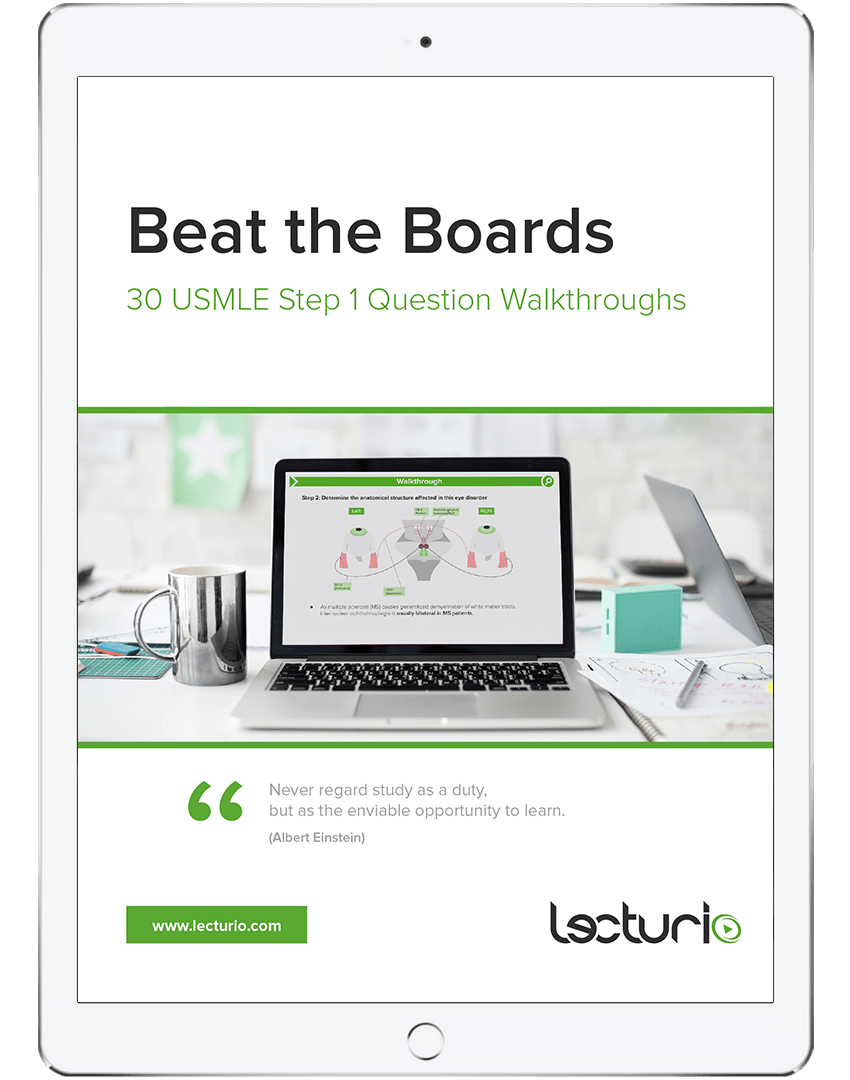What Are Shelf Exams?
While most medical schools have their own exams and processes in place to assess student performance, many also use a pre-made exam from the National Board of Medical Examiners as a part of their curriculum. These exams, which are available “off-the-shelf,” so to speak, are colloquially referred to as “Shelf exams.” Shelf exams are a standardized way to assess students’ medical knowledge and to compare it with other students around the country. The NBME® offers many of these exams, from basic science topics like Biochemistry and Histology to advanced clinical exams in Internal Medicine and Emergency Medicine. Many schools that have you take a Shelf exam also provide you with a score report detailing what content areas you were stronger and weaker in. This score report is very valuable in helping you shore up your weak areas before taking higher-stakes exams like the United States Medical Licensure Exams (USMLE® Step 1 and 2).
Do Shelf Exams Matter for Residency?
Unlike the results of the USMLE® Step exams, the results of your Shelf exams are not reported to residency programs. Taking a Shelf exam is not a requirement for licensure in the United States, either. However, a strong performance on your shelf exam could have an impact on your clinical grades, and it may even be included in a Dean’s Letter or another portion of your residency application. Conversely, a poor grade on your Shelf exam can have a negative impact on your final clerkship grade, and indirectly, on your residency chances.
If you’re interested in a particular specialty, success on the Shelf exam is a good indicator that your study techniques are working well. If you’re interested in matching with a particular specialty for residency, you should strive to master the content that is tested on that Shelf exam. Doing so will give you the best chance not only to do well on the clinical rotation, but will also to help prepare yourself for clinical practice in that specialty and on future board exams.
How to Study for Shelf Exams
Unlike other tests, Shelf exams are standardized across the country and draw from the same shared question bank. While doing well on your clinical clerkship is a great start to doing well on your Shelf exam, you’ll need to take some time to specifically prepare for the Shelf beyond the usual reading you’re doing for clerkship success. The most effective way to prepare for Shelf exams is to devote yourself to completing a question bank that mimics the Shelf itself. Making a reading plan at the start of a clinical rotation and committing to completing a certain number of questions in your question bank every day are tried-and-true methods for success on your Shelf exams.
Where do the Assessment Questions on the Shelf Exam Come From?
The NBME® website curates a comprehensive list of sample content and questions for each Shelf exam. You should familiarize yourself with both the free practice questions and the tutorial interface before you take your Shelf exams to maximize your chances of success. Using this guide can also help you tailor your learning opportunities and experiences on each rotation to ensure you are getting the most out of your clinical experience.
The assessment questions on NBME® Shelf exams are developed by a panel of experts and are intended to mimic those found on the USMLE® Step 1 and 2 exams. Generally speaking, the questions are presented as multiple-choice, and examinees are expected to select a single best answer. The assessment is given under timed, proctored conditions using NBME® software that closely mimics the software used for the USMLE® Step 1 and 2 exams.
Are Shelf Exams Harder than Step 1 or Step 2?
Shelf exams are generally designed to be of comparable difficulty to those you will see on USMLE® Step 1 and Step 2. In fact, many of the questions are retired from previous Step exams! The NBME® writes both the shelf exams and the Step exams, and similar software is used to administer them. The proctoring rules and time constraints are also very similar.
To many students, Shelf exams can seem more difficult than Step 1 or 2. However, this might be because Shelf exams are intended to help you prepare and practice for these subsequent exams, rather than because the tests are designed to be harder. Using the score reports from your shelf exams can help focus your studying on areas of weakness before you take Step 1 or Step 2. If you’re able to improve in these areas, the Step exams may indeed seem easier!
How Does My Shelf Exam Impact My Clerkship Grade?
How your Shelf exam score impacts your final clerkship grade varies significantly from institution to institution. Your clerkship director should provide you with this information at the start of your clinical clerkship so that you can prepare accordingly. On some clerkships, your director may elect to use a raw score in factoring your grade, while others may grade on a curve, either based on your national percentile or in comparison to other students on your clerkship. This approach can vary even from rotation to rotation, so reading your clerkship syllabus is essential to determining how much of an impact a Shelf exam score has on your final grade.
One common method is to assign a percentage to Shelf exam results, to a school-administered test, and to clinical clerkship evaluations. Pay attention to your clerkship syllabus to see which of these items is the most highly weighted, and focus your studying accordingly.
What Time Are Shelf Exams?
Your clerkship syllabus will specify the time of your Shelf exam. Because the exam must be proctored, timed, and standardized using NBME® software, there is generally not much flexibility in terms of when the exam can be administered. Due to strict proctoring rules, you will need to log into the exam at the same time as the other examinees in your cohort using a password provided by your proctor, and you will be monitored carefully by a proctor during the exam. If you need to leave for any reason, you will need to log out according to the instructions provided by your exam proctor.
With the start of the coronavirus pandemic, many medical schools moved to remote proctoring and administration of Shelf exams, which has both challenges and benefits for students. If you are testing remotely, your clerkship director should inform you about what time to log in to your computer to access your shelf exam and about any virtual proctoring requirements.
So, How Do I Pass the Shelf Exam?
The best results on the shelf exam are obtained by sticking to a consistent study schedule. Start each rotation by reviewing your clerkship syllabus so you know when the exam will be held and how much of your grade it will account for. Use the outline content of each Shelf exam provided by the NBME® to help choose a study resource, ideally one with multiple-choice questions, and dedicate yourself to doing a set number of questions and reviewing the answers each day. Keep in mind that your clinical clerkship experience alone is likely not enough to pass a Shelf exam, as you will be tested on conditions you may not have encountered due to the particulars of your rotation. Reviewing, outlining, and consistently testing yourself with questions sets you up best for passing Shelf exams!







